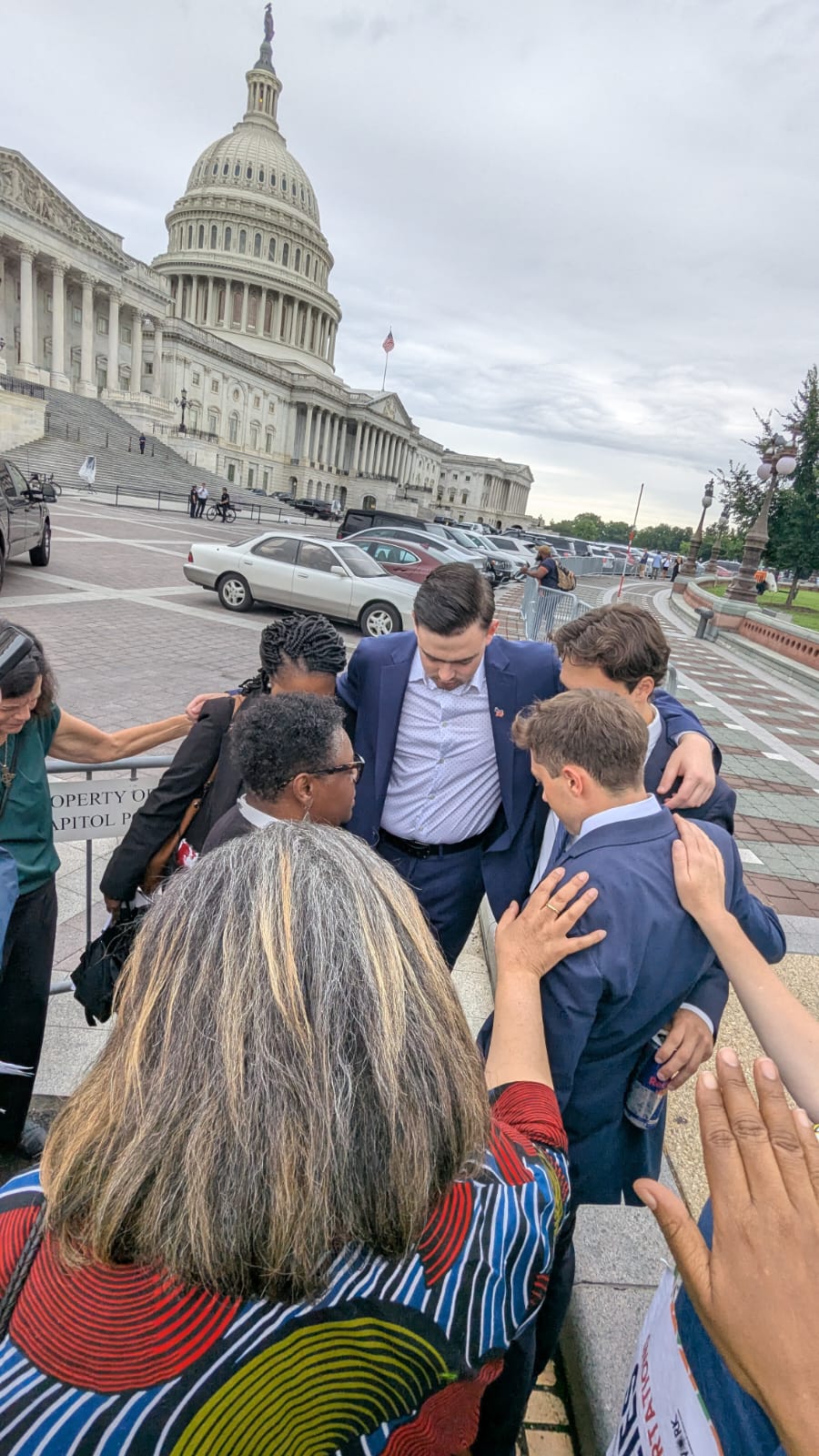Photo of advocates meeting outside the U.S. Capitol Building to urge lawmakers against passage of H.R. 1 on July 2, 2025 by Mark Joyce.
One Big Beautiful Bill’s Impact on Immigration
The U.S. budget proposal passed by the House of Representatives includes anti-immigrant policies. Immigration Advocacy Intern Rehema Klueg reports.
On May 22, the U.S. House of Representatives passed H.R. 1, the One Big Beautiful Bill Act, a “budget reconciliation” megabill, at President Trump’s behest. On July 1, the Senate passed a modified version of the 1,018-page legislation, which was being returned to the House at press time.
The bill, with its wide-ranging scope, is largely unpopular since it encompasses sweeping cuts to social spending and environmental policy while cutting taxes for some wealthy households. Beyond domestic spending, the bill contains immigration provisions with capacity to inflict harm on migrants and refugees.
Below is a noncomprehensive list of immigration policies in the “One Big Beautiful Bill Act” as passed by the House that stand to harm migrants, as analyzed by the National Immigration Forum, National Immigration Law Center, and U.S. Conference of Catholic Bishops:
Funding
New Fees on Applications: The bill establishes an extensive new fee structure for immigration processes, eliminating fee waivers, with significant fees for work permits and immigrants seeking humanitarian protections.
Public programs: This bill will strip away key federal programs that lawfully eligible immigrants have been able to access in the past, including Medicaid, the Children’s Health Insurance Program (CHIP), ACA health coverage subsidies, Supplemental Nutrition Assistance Programs (SNAP), Medicare, and Federal Student Aid under the Higher Education Act.
Child Tax Credit: The reconciliation bill requires that the child and both parents have a social security number in order to claim the child tax credit, potentially excluding 1 million children without Social Security numbers, as well as approximately 2.2 million children who have at least one parent without a Social Security Number. The Senate version of the bill provides that at least one parent must have a social security number to claim the Child Tax Credit.
Unaccompanied Children and Families: The bill would impose prohibitive fees for families seeking to reunite with an unaccompanied child, charging them $8,500, including a “reimbursement” fee of $3,500 and a $5,000 bond, which creates a significant barrier to reunification. It would also provide $100 million to facilitate the expedited removal of unaccompanied children without any access to legal counsel. The Senate Parliamentarian struck this provision as well.
Republican leadership set a deadline for themselves to have the One Big Beautiful Bill Act signed into law by July 4. It remains to be seen if Congress is able to meet that deadline and if the bill can survive the heavy criticism.
Archbishop Timothy Broglio, president of the U.S. Conference of Catholic Bishop, released a statement on June 26 in opposition to immigration policy as outlined in H.R. 1. In an earlier statement he explained his reasoning:
“We cannot abide injustice, and we stress that national self-interest does not justify policies with consequences that are contrary to the moral law. The use of sweeping generalizations to denigrate any group, such as describing all undocumented immigrants as ‘criminals’ or ‘invaders,’ to deprive them of protection under the law, is an affront to God, who has created each of us in his own image.”
FAITH IN ACTION: Urge your Representative to protect human life and dignity and promote the common good by rejecting the “One Big Beautiful Bill Act.” https://mogc.me/stop-obbba

